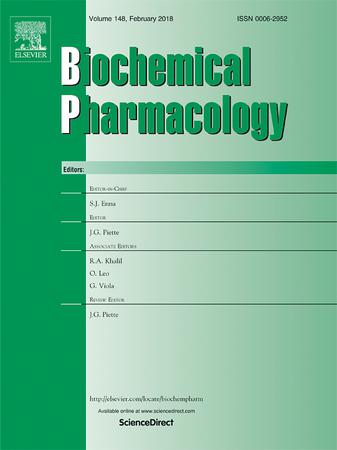天然小分子百里醌通过抑制Wnt/β-catenin信号通路下调MGMT表达,增加胶质母细胞瘤对替莫唑胺的化学敏感性:体外和体内验证
IF 5.6
2区 医学
Q1 PHARMACOLOGY & PHARMACY
引用次数: 0
摘要
替莫唑胺(TMZ)是目前唯一一种用于胶质母细胞瘤治疗的口服一线化疗药物。然而,o6 -甲基鸟嘌呤- dna甲基转移酶(MGMT)可以修复TMZ产生的致死性o6 -甲基鸟嘌呤(O6-MeG)损伤,从而赋予对TMZ的抗性。目前,小分子共价MGMT抑制剂的临床应用受到严重血液学毒性的限制。因此,制定新的策略来克服mgmt介导的耐药性是非常紧迫的。本研究探讨了在胶质母细胞瘤中通过调节Wnt/β-catenin信号通路抑制MGMT表达以克服TMZ耐药的可行性。从8种对Wnt/β-catenin通路有抑制作用的天然产物或获批药物中,我们发现百里香醌(thymoquinone, TQ)在24 h内完全抑制了胶质母细胞瘤SF763和SF767细胞株中MGMT的表达。正如预期的那样,TQ在SF763和SF767细胞中表现出与TMZ的协同杀伤作用,而在MGMT阴性的SF126细胞中仅观察到加性作用。TQ显著增强TMZ对细胞增殖、克隆形成、侵袭和迁移的抑制作用,促进细胞凋亡。在耐药SF763小鼠肿瘤异种移植模型中,TQ显著增强TMZ对肿瘤生长的抑制作用,同时保持良好的生物安全性。Western blotting分析显示,TQ显著抑制β-catenin的核易位以及下游蛋白Cyclin D1和MGMT的表达。Wnt激活剂LiCl的加入逆转了TQ诱导的β-catenin的核易位以及Cyclin D1和MGMT的表达。我们的研究结果首次表明,TQ可以通过干扰Wnt/β-catenin通路下调MGMT表达,从而显著增加胶质母细胞瘤对TMZ的敏感性。本文章由计算机程序翻译,如有差异,请以英文原文为准。

Natural small molecule thymoquinone increases the chemosensitivity of glioblastoma to temozolomide through inhibiting Wnt/β-catenin signaling pathway to downregulate MGMT expression: In vitro and in vivo validation
Temozolomide (TMZ) is the only one oral first-line chemotherapeutic drug for glioblastoma treatment. However, O6-methylguanine-DNA methyltransferase (MGMT) can repair the lethal O6-methylguaine (O6-MeG) lesion produced by TMZ, thus imparting resistance to TMZ. Currently, the clinical utility of small molecule covalent MGMT inhibitors is limited by the occurrence of severe hematological toxicity. Therefore, developing new strategies for overcoming MGMT-mediated resistance is highly urgent. Here, we explored the feasibility that modulating Wnt/β-catenin signaling pathway in glioblastoma to inhibit MGMT expression to overcome TMZ resistance. From eight natural products or approved drugs with inhibitory effects on Wnt/β-catenin pathway, we found thymoquinone (TQ) completely suppressed MGMT expression in glioblastoma SF763 and SF767 cell lines within 24 h. As expected, TQ exhibited synergistic killing effects with TMZ in SF763 and SF767 cells, while in MGMT-negative SF126 cells only additive effect observed. Moreover, TQ remarkably enhanced the inhibition of TMZ on cell proliferation, clone formation, invasion and migration, and promoted cell apoptosis. In resistant SF763 mice tumor xenograft model, TQ significantly increased the suppression of TMZ on tumor growth, meanwhile maintaining good biosafety. Western blotting analysis indicated that TQ significantly inhibited the nuclear translocation of β-catenin and the expression of downstream proteins Cyclin D1 and MGMT. The addition of Wnt activator LiCl reversed the nuclear translocation of β-catenin and the expression of Cyclin D1 and MGMT induced by TQ. For the first time, our findings indicate that TQ can considerably increase the sensitivity of glioblastoma to TMZ by interfering Wnt/β-catenin pathway to downregulate MGMT expression.
求助全文
通过发布文献求助,成功后即可免费获取论文全文。
去求助
来源期刊

Biochemical pharmacology
医学-药学
CiteScore
10.30
自引率
1.70%
发文量
420
审稿时长
17 days
期刊介绍:
Biochemical Pharmacology publishes original research findings, Commentaries and review articles related to the elucidation of cellular and tissue function(s) at the biochemical and molecular levels, the modification of cellular phenotype(s) by genetic, transcriptional/translational or drug/compound-induced modifications, as well as the pharmacodynamics and pharmacokinetics of xenobiotics and drugs, the latter including both small molecules and biologics.
The journal''s target audience includes scientists engaged in the identification and study of the mechanisms of action of xenobiotics, biologics and drugs and in the drug discovery and development process.
All areas of cellular biology and cellular, tissue/organ and whole animal pharmacology fall within the scope of the journal. Drug classes covered include anti-infectives, anti-inflammatory agents, chemotherapeutics, cardiovascular, endocrinological, immunological, metabolic, neurological and psychiatric drugs, as well as research on drug metabolism and kinetics. While medicinal chemistry is a topic of complimentary interest, manuscripts in this area must contain sufficient biological data to characterize pharmacologically the compounds reported. Submissions describing work focused predominately on chemical synthesis and molecular modeling will not be considered for review.
While particular emphasis is placed on reporting the results of molecular and biochemical studies, research involving the use of tissue and animal models of human pathophysiology and toxicology is of interest to the extent that it helps define drug mechanisms of action, safety and efficacy.
 求助内容:
求助内容: 应助结果提醒方式:
应助结果提醒方式:


